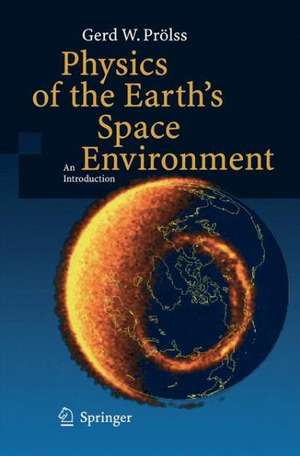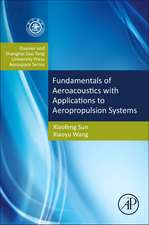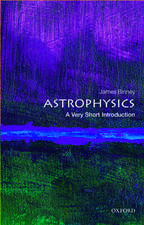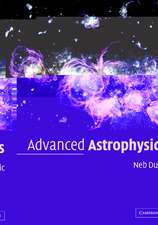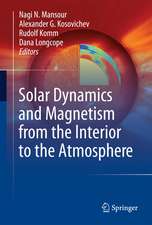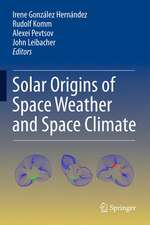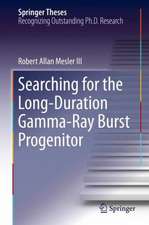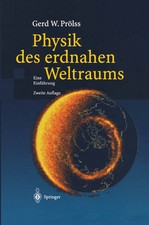Physics of the Earth’s Space Environment: An Introduction
Autor Gerd Prölss Traducere de Michael Keith Birden Limba Engleză Paperback – 30 noi 2010
| Toate formatele și edițiile | Preț | Express |
|---|---|---|
| Paperback (1) | 478.93 lei 39-44 zile | |
| Springer Berlin, Heidelberg – 30 noi 2010 | 478.93 lei 39-44 zile | |
| Hardback (1) | 720.04 lei 6-8 săpt. | |
| Springer Berlin, Heidelberg – 22 iul 2004 | 720.04 lei 6-8 săpt. |
Preț: 478.93 lei
Preț vechi: 591.27 lei
-19% Nou
Puncte Express: 718
Preț estimativ în valută:
91.65€ • 97.100$ • 76.41£
91.65€ • 97.100$ • 76.41£
Carte tipărită la comandă
Livrare economică 14-19 aprilie
Preluare comenzi: 021 569.72.76
Specificații
ISBN-13: 9783642059797
ISBN-10: 3642059791
Pagini: 532
Ilustrații: XV, 513 p.
Dimensiuni: 155 x 235 x 32 mm
Greutate: 0.89 kg
Ediția:Softcover reprint of the original 1st ed. 2004
Editura: Springer Berlin, Heidelberg
Colecția Springer
Locul publicării:Berlin, Heidelberg, Germany
ISBN-10: 3642059791
Pagini: 532
Ilustrații: XV, 513 p.
Dimensiuni: 155 x 235 x 32 mm
Greutate: 0.89 kg
Ediția:Softcover reprint of the original 1st ed. 2004
Editura: Springer Berlin, Heidelberg
Colecția Springer
Locul publicării:Berlin, Heidelberg, Germany
Public țintă
GraduateCuprins
1. Introduction.- 1.1 Definitions and Constraints.- 1.2 Scope and Organization of the Material.- 1.3 Brief History of Space Research.- 2. Neutral Upper Atmosphere.- 2.1 State Parameters of Gases and their Gas Kinetic Interpretation.- 2.2 Height Profiles of the State Parameters.- 2.3 Barospheric Density Distribution.- 2.4 Exospheric Density Distribution.- 3. Absorption of Solar Radiation Energy.- 3.1 Origin and Characteristics of Solar Radiation.- 3.2 Extinction of Solar Radiation in the Upper Atmosphere.- 3.3 Heating and Temperature Profile.- 3.4 Thermospheric Winds.- 3.5 Atmospheric Waves.- 4. Ionosphere.- 4.1 Height Profile of Ionospheric State Parameters.- 4.2 Ionization Production and Loss.- 4.3 Density Profile in the Lower Ionosphere.- 4.4 Density Profile in the Upper Ionosphere.- 4.5 Density Maximum and Ionospheric Time Constants.- 4.6 Systematic Variations of the Ionization Density.- 4.7 Radio waves in the Ionosphere.- 5. Magnetosphere.- 5.1 Fundamentals.- 5.2 The Geomagnetic Field Near the Earth.- 5.3 Charged Particle Motion in the Geomagnetic Field.- 5.4 Particle Populations in the Inner Magnetosphere.- 5.5 The Distant Geomagnetic Field.- 5.6 Particle Populations in the Outer Magnetosphere.- 5.7 Magnetoplasma Waves in the Magnetosphere.- 6. Interplanetary Medium.- 6.1 The Solar Wind.- 6.2 Interplanetary Magnetic Field.- 6.3 Magnetoplasma Waves in the Interplanetary Medium.- 6.4 Modification of the Solar Wind by the Bow Shock.- 6.5 Interaction of the Solar Wind with the Interstellar Medium.- 6.6 Energetic Particles in Interplanetary Space.- 7. Absorption and Dissipation of Solar Wind Energy.- 7.1 Topology of the Polar Upper Atmosphere.- 7.2 Electric Fields and Plasma Convection.- 7.3 Ionospheric Conductivity and Currents.- 7.4 Aurorae.- 7.5 Neutral Atmospheric Effects.- 7.6 Energy Transfer from Solar Wind to Magnetosphere.- 8. Geospheric Storms.- 8.1 Magnetic Storms.- 8.2 Auroral Substorms.- 8.3 Magnetospheric Substorms.- 8.4 Thermospheric Storms.- 8.5 Ionospheric Storms.- 8.6 The Sun as the Origin of Geospheric Storms.- 8.7 Disturbance Effects on Technological Systems.- A. Formulas, Tables and Derivations.- A.l Selected Mathematical Formulas.- A.2 Physical Parameters of the Earth.- A.3 Planetary Data.- A.4 Model Atmosphere.- A.5 Diffusion Equation for Gases.- A.6 Derivation of the Momentum Balance Equation.- A.7 Energy Balance Equation of an Adiabatic Gas Flow.- A.8 Bernoulh Equation.- A.9 Rankine-Hugoniot Equations.- A.10 Maxwell Equations.- A. 11 Curvature of a Dipole Field Line.- A. 12 Gradient Drift Velocity.- A. 13 System of Equations for Ideal Magnetoplasmadynamics.- A.13.1 Balance Equations of a Magnetoplasma.- A. 13.2 Maxwell Equations and the Generahzed Ohm’s Law.- A. 13.3 Validity Test of the Approximations.- A. 14 Two Theorems of Magnetoplasmadynamics.- A. 15 Magnetoplasma Waves.- A.15.1 Simplification of the System of Equations.- A.15.2 Wave Propagation Parallel to a Magnetic Field.- A. 15.3 Wave Propagation Perpendicular toa Magnetic Field.- A.15.4 Validity Test of the Approximations.- A.16 Plasma Instabilities.- B. Figure and Table References.
Recenzii
From the reviews:
"This book is aimed towards readers who are interested in space research. The prerequisite for a full and beneficial reading is a knowledge of fundamental physics and mathematics, a knowledge that is usually acquired in undergraduate studies in science or engineering. These reviewers believe that this book will be quite useful for a general physics teacher who wants to find new applications of fundamental physics. … The figures, illustrations and typesetting of the book are of good quality as usually with Springer … ." (Fernande Grandjean, Physicalia Magazine, Vol. 28 (1), 2006)
"This book is aimed towards readers who are interested in space research. The prerequisite for a full and beneficial reading is a knowledge of fundamental physics and mathematics, a knowledge that is usually acquired in undergraduate studies in science or engineering. These reviewers believe that this book will be quite useful for a general physics teacher who wants to find new applications of fundamental physics. … The figures, illustrations and typesetting of the book are of good quality as usually with Springer … ." (Fernande Grandjean, Physicalia Magazine, Vol. 28 (1), 2006)
Textul de pe ultima copertă
This book on the terrestrial space environment is directed at a broad group of students and scientists, who seek knowledge of the methods and results of space research. The only prerequisites are fundamental physics and mathematics as usually acquired in introductory college courses in science or engineering curricula. Stressing physical insight rather than mathematical precision, "Physics of the Earth’s Space Environment" derives further knowledge on selected topics as each phenomenon is considered and strives to present experimental results in conjunction with basic reasoning about the underlying physics. The content’s breadth and introductory nature make this an ideal reader for students in geophysics, meteorology, space sciences and astronomy
Caracteristici
The first advanced undergraduate textbook that treats the terrestrial space environment ranging from the upper atmosphere to the interplanetary medium on the same footing
